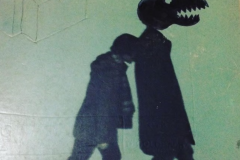Necessity is the mother of invention and after a decade as the principal songwriter and singer of acclaimed band, Southeast Engine, Adam Remnant found himself with the necessities of a host of new responsibilities and his band parting ways. Invention eventually found itself in the form of a modest studio in his basement, where he continued writing and recording what would be 2016’s EP When I Was a Boy and the new full-length, Sourwood out today on Anyway Records. The songs on these releases still work through characters but are Remnant’s most direct to date as yearning struggles with contentment and the past is set under new light.
Ghettoblaster: As the primary songwriter from Southeast Engine, did you feel the need to differentiate songs that would be released under your own name? Does it feel more like a new project or a continuation?
Adam Remnant: I started writing this cycle of songs in the latter days of Southeast Engine, and I wanted to write material that drew more directly from my own experience. The last couple Southeast Engine releases were lyrically character-based with imagery and storytelling that didn’t mirror my own personal experience. These new songs at least vaguely resemble my actual life and that seems a fitting coincidence for releasing music under my own name.
GB: You’d built up a nice following with Southeast Engine, did it ever cross your mind to try and keep releasing music under that name?
AR: The idea crossed my mind, but I never entertained it seriously. I needed to step back from the demands of the band. A clean slate seemed appealing as I figured out how to move forward. I also didn’t think it would be fair to the band members for me to use the band name without their participation. I might have written the songs in Southeast Engine, but it operated as a band.
GB: I’d imagine it could also be very freeing to release music under a new name after so many years and the expectations that longevity can bring. Are there other styles of music that you could see yourself exploring or incorporating without fear of it being seen as too big a deviation?
AR: It certainly seemed more logical to record something more lo-fi or homespun under a new name than it would have for Southeast Engine with a catalog of 5 previous albums. I’m always looking to explore new sounds or find a new angle to approach my music, and I suspect that would be the same regardless of what name I use. Recently, I bought a synthesizer and I’ve been acquiring more guitar pedals as well to explore more sounds, so perhaps that could send me in some new directions.
GB: You’ve had the recordings for Sourwood for awhile now as they were recorded alongside last year’s When I Was A Boy EP. Had you kept at work on the album or is this more or less what you had recorded then? Was it hard to not want to keep tinkering with them?
AR: The basic tracking was done during the same time as the When I Was a Boy songs, but I definitely kept working on these recordings all the way up until I submitted them for mastering about 6 months ago. Since the release of the EP, I had started working with a live band consisting of my brother, Jesse Remnant, plus Columbus musicians Ryan Stolte-Sawa and Jon Helm. I brought all of them in to contribute overdubs to flesh the recordings out. Sourwood grew to have a larger production overall with their help.
GB: Sourwood and When I Was a Boy were both recorded at your home self-built studio. Thinking of the recordings and the recording process, what did you like and what might you change about this new set up?
AR: The process was largely a matter of necessity. My wife and I had two daughters and those early years of parenting were super demanding. I wasn’t out playing shows to raise money to go into the studio, so I figured I would try to record myself at home on whatever recording devices I could afford. I didn’t have a band to record with as well, so I was largely playing each instrument myself by overdubbing each part. I don’t recommend this process – it’s excessively time-consuming and challenging to get a natural feel that you can easily accomplish by recording people playing together in real time. However, I did fall in love with the recording process and the DIY approach to record making. I imagine my next effort will be home-recorded again, but I’ll be sure to do the initial basic tracking live with my band.
GB: You’ve said yourself that these releases are much more direct than Southeast Engine’s albums, do you think that will be a theme going forward with albums under your own name?
AR: Not necessarily. These new releases are more directly personal, but I consider every record I’ve made to be personal in their own way. My writing process always starts in an exploratory way and eventually a song starts to take shape. Sometimes the song mirrors my own reality and sometimes I write from the perspective of another character with a different reality that allows me to explore an idea or feeling that I wouldn’t be able to otherwise. I’ve got a bunch of new songs written currently and there is more of a mix this time around. The challenge will be trying to figure out how they all go together.
GB: This is your first release on Anyway, how did that relationships come together?
AR: I’ve been a fan of Anyway Records for quite a while. I especially loved the more recent releases by St. Lenox and Counterfeit Madison. My friend, Brian Koscho, who works at Stuart’s Opera House and runs the Ohio music promoter Aquabear Legion, knew that I was looking for a label to help with this record. He connected me with Bela Koe-Krompecher, who runs Anyway Records. I sent Bela the record and it came together to put this record out with Anyway. I’m super excited to be in such good company.
GB: Your music is very informed by your surroundings, can you talk a little about the romanticism you feel for the Midwest and Ohio in 2018?
AR: Yeah, I think Sourwood deals with some of the frustrations of living in the Midwest and how one can imagine more opportunities at some coastal destination, but I think I also take pride in being from Ohio and the Midwest. If anything, the Midwest keeps you humble. Whenever I’ve traveled to cities on the coasts to play music, I think people find us Midwesterners to be refreshing because we lack the pretension you might find in those larger cities. We have got to do better with politics though – I was super disappointed to see Ohio vote for Trump. We need to right this wrong come midterms and the next presidential election.
GB: In an interview with Columbus Alive you talked about having your identity wrapped up as a touring musician and then the struggle with having to give that up. What sort of thoughts were running through your head as you were coming to grips with this change in your life?
AR: I wanted to get off the touring cycle and all of its demands, but as time passed at home I felt a deep sense that I wasn’t fulfilling this hugely important part of who I am as a songwriter and musician. These have been really sweet years at home with the family, but I also learned how strongly I am compelled to record and perform music. Working on this album and the previous EP allowed me to keep working on music during that time. It went really slow because my wife and I were taking care of our daughters and trying to pay the bills, but it helped me feel like I was working toward something. Now my daughters are going into school and the demand on us as parents is becoming more manageable, so I’m starting to perform more again and do some touring as well. I’m finding more of a balance. So far, so good. My band and I have a bunch of dates scheduled for the fall, and it feels great to be out there performing for folks again.
Photo: Amanda Remnant
Facebook | Instagram | Twitter | Website









Social Media